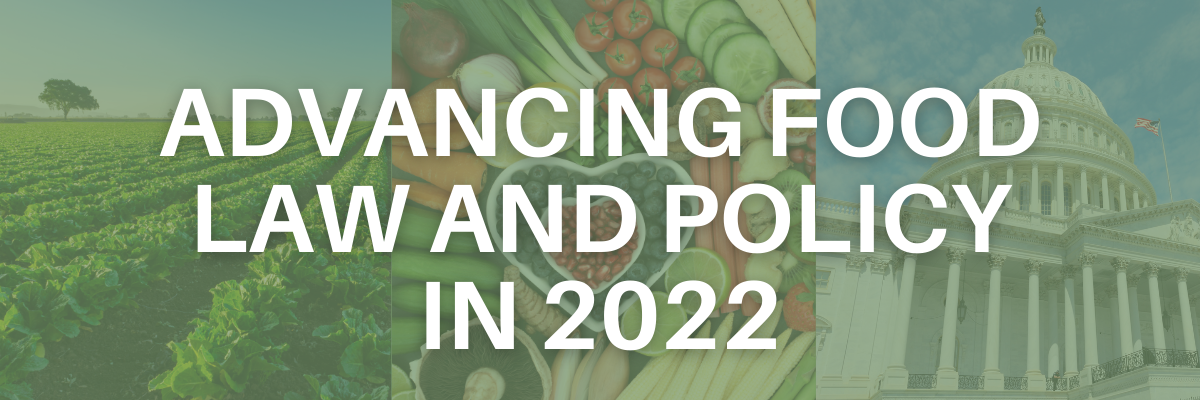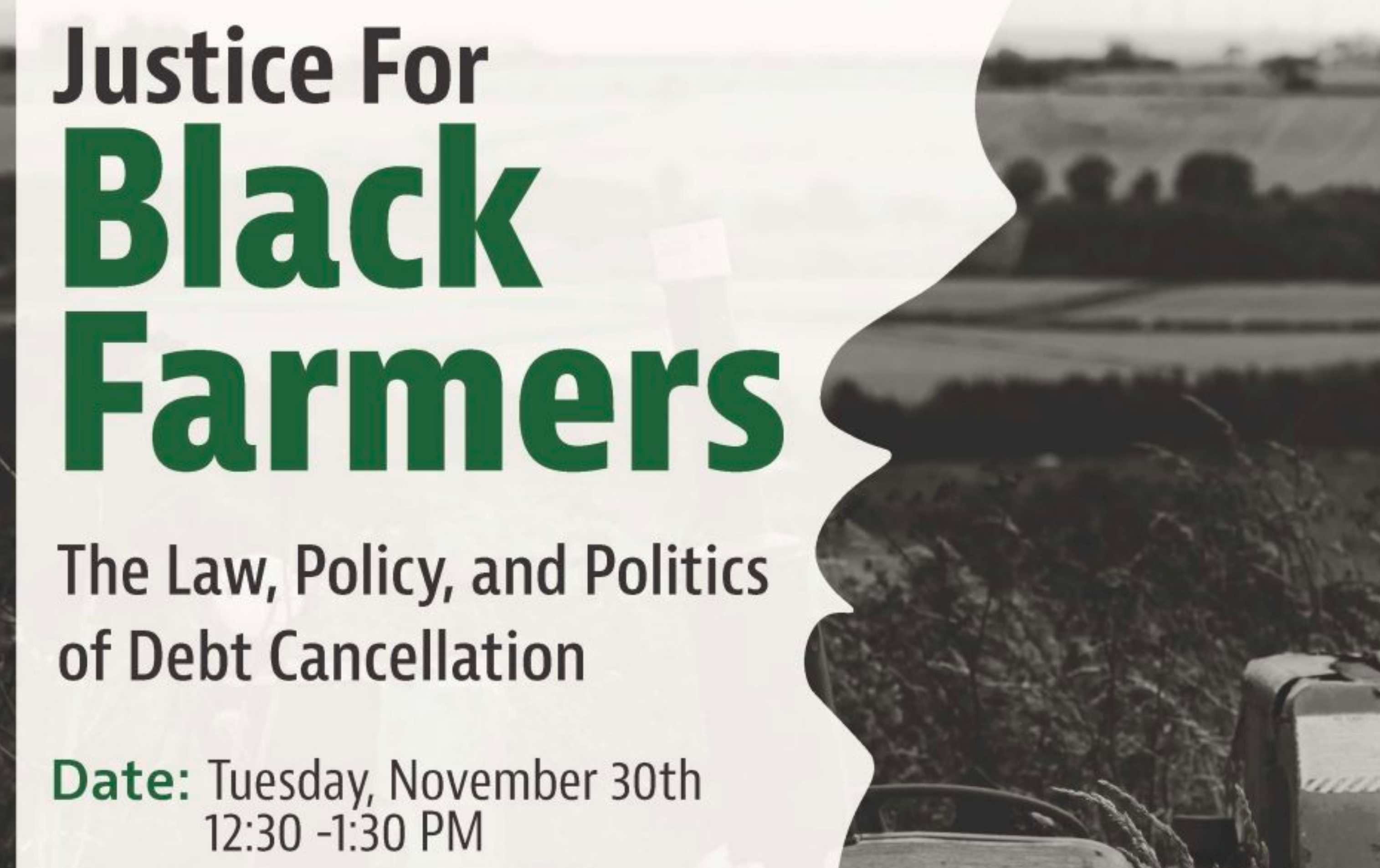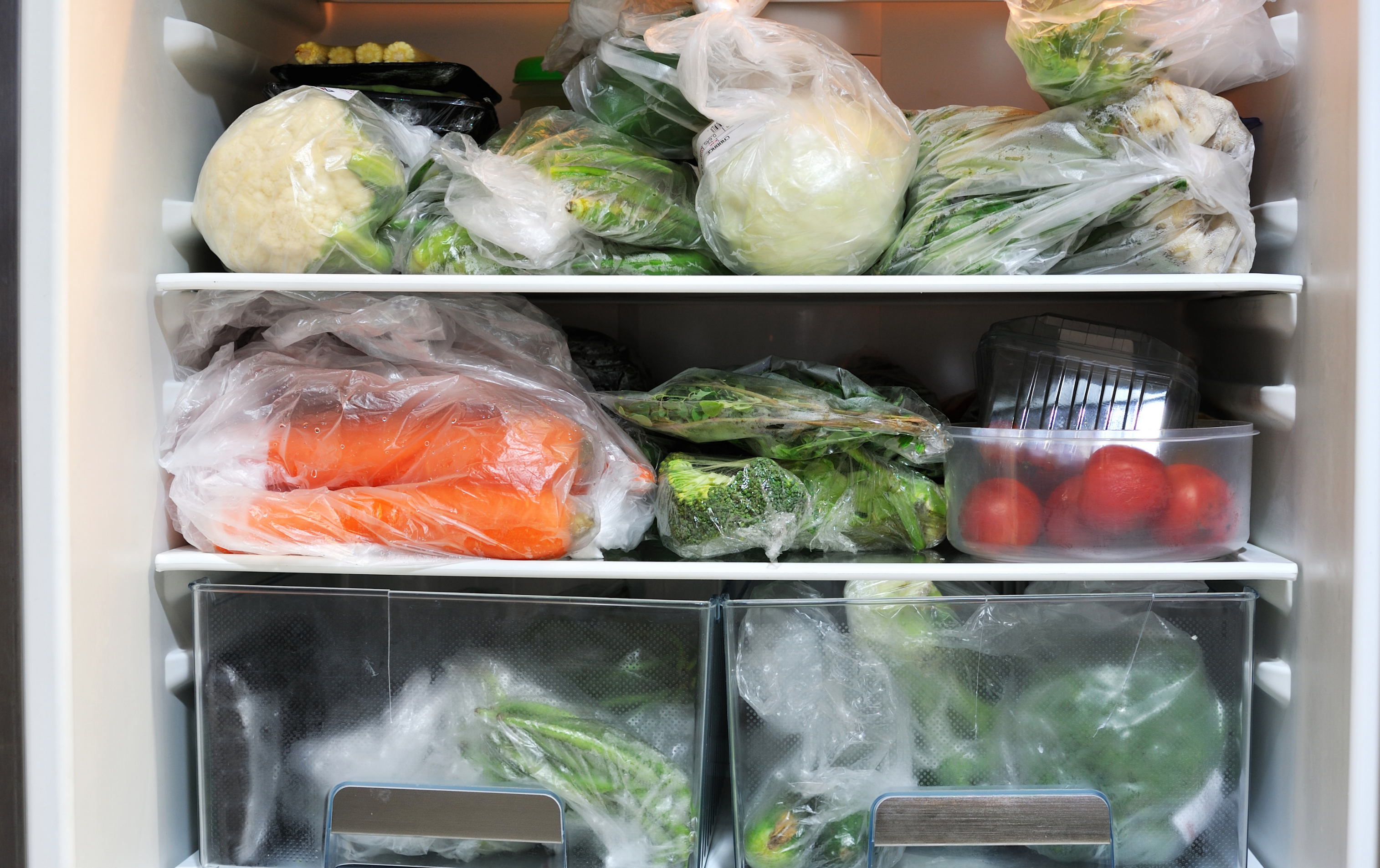| | | | February 2022 • Issue No. 15 | | Food Law and Policy in 2022: What We're Watching | |  | Opportunities abound in 2022 for the food law and policy field. After a year full of promising policy developments for our food and agriculture systems, there remains growing momentum among government, industry, and nonprofit stakeholders to address the food-related challenges impacting our environment, health, and economy. In the coming year, the Food Law and Policy Clinic (FLPC) is tracking major opportunities for change, including: - Food Waste Legislation: In 2021, members of Congress introduced several bills that would help to drastically reduce food loss and waste in the US, including the Food Date Labeling Act, the Food Donation Improvement Act, and the Zero Food Waste Act. Each of these bills draws on policy solutions long sought by FLPC. We will track each bill in the coming year while working to educate policymakers about the positive impact they would have.
- 2023 Farm Bill: The next farm bill is quickly approaching; slated for 2023, farm bill discussions and negotiations will pick up this year. To help inform the conversations, FLPC will lead the Farm Bill Law Enterprise on publishing several reports with recommendations we hope to see incorporated in the next farm bill. We'll focus specifically on mitigating climate change, the role of the farm bill’s nutrition programs in combatting food insecurity, promoting farm viability of small and mid-sized producers, advancing socio-economic development in rural communities, USDA’s role in supporting agricultural workers, and the disparate treatment of BIPOC farmers in USDA programs. We will also work with partners in the food waste sector to publish an updated report on opportunities to reduce food waste in the farm bill.
- Nutrition Education for Doctors: In November 2021, Representatives Jim McGovern and Michael Burgess introduced a resolution that encourages medical schools, graduate medical education programs, and other health professional training programs to provide education on nutrition and diet. While the resolution does not make mandatory changes to healthcare training, it paves the way for future action. FLPC will continue to track developments on the issue.
- White House Conference on Hunger and Nutrition: In October 2021, Representative Jim McGovern introduced legislation calling for a White House Conference on Food, Nutrition, Hunger, and Health. The proposed conference would aim to end hunger, combat nutrition insecurity, build a more resilient food system, and create more sustainable food markets—aligned with our calls for a national food strategy.
In addition to the above, FLPC will continue to build on its efforts to reduce food waste in the US and around the world, facilitate community-led food system change, improve access to food and nutrition, and support sustainable and equitable food production. For updates on our work in these areas, explore our recent publications, events, and news below. | | | | | | | | Recent Publications and Events | |  | Justice for Black Farmers: The Law, Policy, and Politics of Debt Cancellation In November 2021, FLPC hosted a webinar featuring Lawrence Lucas of the USDA Coalition of Minority Employees, Tracy Lloyd McCurty of the Black Belt Justice Center, Keisha Stokes-Hough of the Southern Poverty Law Center, and Moderator Safiya Charles of The Counter. Panelists examined USDA’s civil rights record, shared their experiences in the fight for debt cancellation, and analyzed the legal issues at stake, many of which will have important repercussions for public policy in the coming decades. | |  | Community Fridges: Legal Questions and Answers In January 2022, FLPC published a list of common legal questions from community fridge organizers and volunteers, along with answers. The living document also includes a link to submit further questions on the subject. The Q&A was published in collaboration with the Hofstra Law School Community and Economic Development Clinic and the UCLA School of Law Food Law and Policy Clinic, with significant input from the Sustainable Economies Law Center. | |  | | | | | | | | | | | Student and Alumni Spotlight | | Ava Cilia Named 2022 Skadden Foundation Fellow Former FLPC student Ava Cilia was recently named a 2022 Skadden Foundation Fellow! Ava is headed to Brooklyn Defenders to address the harmful impacts of the New York State Center Registry of Child Abuse and Neglect. Congratulations, Ava! Regina Paparo Testifies for Massachusetts Cottage Food Bill In November, FLPC student Regina Paparo provided testimony to Massachusetts' Joint Committee on Environment, Natural Resources and Agriculture on the potential for cottage food laws to help the Commonwealth create a more equitable recovery from the pandemic. Bravo, Regina! | | | | | | | | | | Welcome, Molly Cohen FLPC is pleased to welcome Molly Cohen as a Clinical Instructor! Molly joined the FLPC team in January 2022 after working in local government for eight years focusing on economic development, financial empowerment, and criminal justice reform. | | | | Welcome, Trevor Findley FLPC extends a warm welcome to Trevor Findley as a Clinical Instructor! Prior to joining FLPC in January 2022, Trevor worked as a Senior Policy Associate for the Organic Farming Research Foundation and as the Deputy Director of Food Disclosure and Labeling at the United States Department of Agriculture. | | | | | | Our New Website In December 2021, FLPC launched a new website along with our colleagues at the Center for Health Law and Policy Innovation. The website was built to help our partners, clients, students, and other visitors find the information they need to better advance more equitable and sustainable laws and policies in health and food systems. | | | | | | | | | | | | | | The Harvard Law School Food Law and Policy Clinic (FLPC) serves partner organizations and communities by providing guidance on cutting-edge food system issues, while engaging law students in the practice of food law and policy. FLPC’s work focuses on increasing access to healthy foods, supporting sustainable production and regional food systems, promoting community-led food system change, and reducing waste of healthy, wholesome food. FLPC is committed to advancing a cross-sector, multi-disciplinary and inclusive approach to its work, building partnerships with academic institutions, government agencies, private sector actors, and civil society with expertise in public health, the environment, and the economy. Learn more about FLPC. | | | | | | | | | | | |